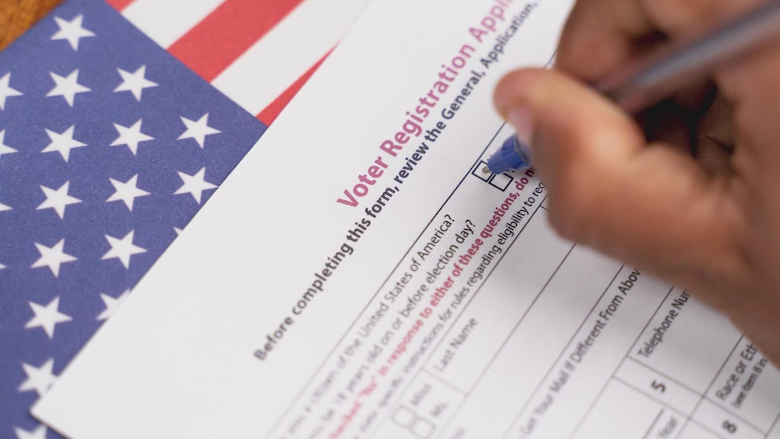A federal judge appointed by former President Donald Trump has partially dismissed the Republican National Committee’s (RNC) lawsuit that aimed to challenge the eligibility of over 225,000 registered voters in North Carolina. This decision, which keeps these voters on the rolls, arrives amid claims by the RNC and the North Carolina Republican Party (NCGOP) that the North Carolina State Board of Elections (NCSBE) failed to follow federal requirements for verifying voter information.
The lawsuit, filed by the RNC and the NCGOP, accused the NCSBE of not complying with the Help America Vote Act (HAVA), a federal law enacted to establish national standards for voter registration. The RNC contended that the NCSBE processed registrations without collecting critical identification information required by law, such as driver’s license numbers or Social Security numbers. Without this information, they argued, the voter rolls could include ineligible individuals, including non-citizens, potentially diluting lawful votes and undermining public trust in the integrity of elections.
In its complaint, the RNC stated:
“The North Carolina State Board of Elections (‘NCSBE’) betrayed that trust when it allowed over 225,000 people to register to vote with registration forms that failed to collect certain required identification information before the registration forms were processed, a plain violation of Section 303 of the Help America Vote Act (‘HAVA’). Because of these errors, the North Carolina voter rolls, which both HAVA and state law mandates that Defendants regularly maintain, are potentially replete with ineligible voters—including possible non-citizens—all of whom are now registered to vote.”
The RNC and NCGOP further alleged that the NCSBE had acknowledged these errors but refused to take retroactive action to correct past registrations, even though it has since updated its forms to align with HAVA’s requirements. The RNC had demanded that the NCSBE apply the updated standards to all previously accepted registrations but claimed that the board had resisted making any changes. According to the RNC, this lack of corrective action left the voter rolls vulnerable and undermined the electoral process.
“Defendants admit they violated HAVA and, as a result, state law. Yet, even when concerned citizens brought these issues to their attention, Defendants inexplicably refused to correct their wrongs. All Defendants offer as a solution is a half-hearted promise that those who were ineligible to register but were allowed to anyway will naturally filter themselves out from the state’s voter rolls when they conduct other election-related activities,” the RNC argued.
On October 20, Judge Richard E. Myers, appointed to the federal bench by former President Trump, issued a ruling on the RNC’s claims. He dismissed the primary claim on the basis that HAVA does not establish a “private right of action.” This legal standard means that only government authorities, such as state or federal agencies, have the authority to enforce compliance with HAVA. In his ruling, Judge Myers explained that private organizations, including political parties, cannot bring federal lawsuits solely on the grounds of perceived violations of HAVA. Instead, such matters should be handled by authorized state and federal authorities who have the legal capacity to enforce these requirements.
However, Judge Myers did not dismiss the entire case. Instead, he remanded the remaining state-based claims back to the North Carolina courts for further consideration. These claims, grounded in North Carolina state law, specifically focus on whether NCSBE is legally required to identify and rectify inaccuracies in the voter registration list under state law. The relevant statute, North Carolina General Statute § 163-82.11(c), mandates periodic maintenance of voter rolls to prevent ineligible individuals from remaining on the list.
The judge’s ruling means that any further action regarding the 225,000 voters in question now falls under the jurisdiction of North Carolina’s state courts, not the federal court system. If the state courts decide that the NCSBE is obligated under North Carolina law to address the alleged errors, they could potentially mandate corrective actions to revise the voter rolls in alignment with state requirements. The decision represents a significant setback for the RNC’s efforts to challenge voter eligibility in North Carolina on the federal level, though their claims may still be considered under state law.
This case arrives amid heightened attention to election security and voter roll maintenance across the United States. Supporters of voter roll cleanups argue that these measures are essential to protect the integrity of elections by ensuring that only eligible voters are on the rolls. Opponents, however, contend that purging voter rolls without clear justification risks disenfranchising eligible voters and reducing access to the ballot.
The NCSBE, which has come under scrutiny due to this lawsuit, argues that its practices are designed to balance compliance with federal and state law while safeguarding voter rights. Though it has acknowledged that its registration form previously did not fully meet HAVA’s standards, the board maintains that it has taken steps to correct these issues going forward. NCSBE officials have emphasized that additional maintenance of voter rolls is conducted as required by both HAVA and state statutes, though they declined the RNC’s request to revisit past registrations.
Judge Myers’ ruling underscores a key legal interpretation of HAVA’s enforcement provisions, indicating that enforcement responsibility lies with designated government entities rather than private organizations. This limitation on private enforcement could influence other cases in which groups seek to challenge election board actions based on federal registration standards.
As North Carolina’s state courts now take up the remaining claims, their decisions could have significant implications for the state’s voter roll policies. This case adds to the ongoing debate over the role of voter registration laws, enforcement mechanisms, and the balance between electoral integrity and access to the ballot. With less than a month remaining until Election Day, the stakes for accurate voter rolls and election security remain high, and the outcome of this case may shape similar challenges in other states.

